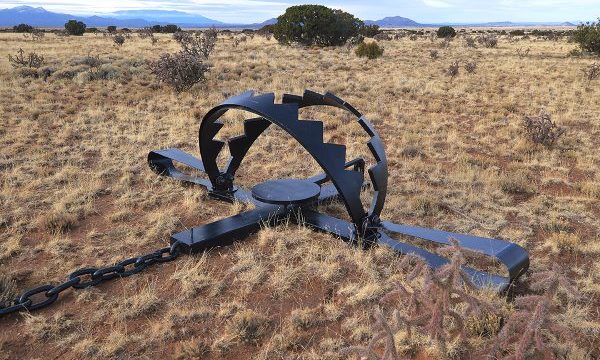
Let's make trapping reform a reality through 24-hour trap checks
Wyoming Untrapped recommended a requirement for 24-hour trap checks through the Wyoming Legislature. See our original Request Form. In order to minimize stress, struggling, exertion, injury, and unnecessary mortality to target and non-target species, we respectfully request that our Legislative leaders review our requests and adopt legislation for all restraining traps and snares set for all species in Wyoming be visually inspected at least once each day or every 24 hours.
Trapping Reform is Overdue
Why 24-hour trap checks:
Currently, in Wyoming, traps need to be checked every 72-hours and snares can go as long as 13 days without being checked. Daily trap checks are common throughout the US with thirty-six states adopting a 24-hour or daily trap inspection requirement. Even Western states like Washington, California, Arizona, New Mexico, and Colorado have these laws.
Scientific studies show that 24-hour trap checks help reduce the severity of injuries to captured animals. Long restraint time is associated with struggling, injury, dehydration, starvation, and exposure to the elements (cold, moisture, sun and heat, etc) These same injuries occur to non-target animals and with 24-hour trap checks there is an increased chance of not causing permanent damage or death to non-target captures in traps. Requiring traps to be checked more frequently would likely increase the chance for survival for these species if they can be released alive and less seriously injured.
Wildlife agencies support daily trap check inspections.
Wyoming Game and Fish Department even has a 24-hour trap check statement on their Hunter’s Education course online. The Association of Fish and Wildlife Agencies Trapper Education Manual urges trappers to “make a commitment to check your traps at least once every day” in order to reduce suffering, more quickly release non-target animals and actually improve the success of getting an intact animal in a trap.
Other States are taking action.
Additional information can be found here…


Survey of Trap Check Requirements in the United States - 2021
The number of states which have adopted:
24-hour or daily check requirements for at least some traps: 36
48-hour (or more frequent) check requirements for at least some traps): 41
72-hour (or more frequent) check requirements for at least some traps: 44
24-hour or daily check requirements for all traps: 30
48-hour (or more frequent) check requirements for all traps: 34
72-hour (or more frequent) check requirements for all traps: 40
Check requirements for all traps: 45
No general check requirements: 3
*The state of Hawaii does not permit furbearer trapping
Additional Focus on Trapping Reform
WU has in the past, and continues to, assert that the following trapping regulation changes, short of a ban, are necessary. Please stay tuned as we work through the process to create a safe and humane environment on our public lands.
- Trap Free Areas (Legislature and/or Commission) – Ask for trap-free areas for heavily used public recreation areas in Teton County, Fremont County and statewide. Access to trap free lands is a public right.
- Ban of all trigger-loaded Power snares and Senneker snares (Legislature and/or Commission)– Power Snares and Senneker snares are extremely lethal, non-target species including pets are killed almost instantly. These traps should not be allowed on Wyoming’s landscape.
- Mandatory Signage (Legislature) – Caution signs, warning recreationalist, hunters, anglers and non-consumptive users of the dangers of trapping and specific trap placement on public lands, should be a mandatory requirement.
- Trap Set Backs (Commission) – Trap setbacks of 300 feet off of busy public trails statewide. The public has a right to safe travel on trails, this right extends to their traveling companions, including dogs and livestock.
- Mandatory Reporting – Non Target and Pets (Legislature) – Reporting of all non-target species trapped and/or killed, including pets. Trappers and the Wyoming Game and Fish would argue that trapping is a management tool. Without mandatory reporting there is no data, without data there is no management.
- Mandatory Reporting – All Species (Legislature) – Reporting of all species trapped. See above. Trappers and the Wyoming Game and Fish would argue that trapping is a management tool. Without mandatory reporting there is no data, without data there is no management.
- Mandatory Trapper Education (Legislature) – Mandatory trapper education should be a requirement. Idaho’s mandatory Trapper Education Law went into effect July 1, 2018. This law requires first time trappers to complete a Trapper Education Course before purchasing a license. The class is designed to teach trappers how to “minimize impact on others” as well as best practices to avoid trapping, injuring and killing non-target animals. Wyoming is lagging behind our neighboring states on trap reform that would make our public lands safer for all.
- Mandatory Conservation Stamp Purchase (Legislature) – “Funds from the conservation stamp purchase are used to support habitat and wildlife projects in Wyoming”. (Quote from WG&F website) Anglers and Hunters are required to purchase a Conservation Stamp, trappers are not. Trappers, who use the public’s wildlife for economic gain, should, more than any other user, be required to purchase a Conservation Stamp.
- Live Traps (Commission) – Live traps should be used wherever and whenever possible. Live traps would ensure that non target species, including protected and endangered species, can be released unharmed. Snares, leg hold, Conibear, Senneker and Power Snares are non-discriminate, they kill and maim regardless of species and protection status.
- 24-Hour Trap Checks ( Legislature) – Support of 24-hour trap checks statewide by writing your state representatives. Changing this law will require action by the Wyoming State Legislature. Wyoming is one of fourteen states that have not addressed the need for 24 hour trap checks. Wyoming state law currently requires a 72-hour check for leg hold traps and up to 13 days for snares and quick kill traps. Long trap check cycles result in suffering, pain, dehydration, starvation and loss of litters when a female/mother is trapped. For family pets that have been trapped, a 24-hour trap check could mean the difference between life and death.
- Require all traps and snares removed at the end of trapping season (Legislature) – Thousands of traps and snares are left behind on our public landscapes at the end of trapping season. Some remain active. Trappers should be responsible for cleaning up all litter and hazards which they have placed on the land.
- Initiate statewide trapping reform stakeholder task force ( Legislature) – Trapping reform awareness statewide is growing rapidly which is initiating more public involvement and demand for immediate change.
- Review furbearer trapping regulations every two years ( Legislature) – Trapping regulations are scheduled for review on a three-year time frame. However, hunting and fishing are reviewed every two years.
Talking Points
It is usually most effective to be persuasive, but not rude, sarcastic or angry. Speak from the heart of one who is more inclined to support our Legislators if and when doing what is best and right for all residents and visitors in Wyoming, now and into the future. Original words directly from your own heart and mind are more likely to be given consideration than words and phrases that sound scripted.
Why are frequent trap checks needed?
- 24-hour trap check times are common. Thirty-six states have adopted 24-hour or daily trap inspection requirements for at least some types of traps or trapping situations, including western states like, California, Arizona, New Mexico, Colorado, and 32 others, require 24-hour trap checks in at least some trapping situations or for some trap types.
- Animals suffer because of lax trap check times. Wildlife and family pets frequently sustain severe injuries from being trapped, ranging from claw loss and deep flesh cuts to broken bones and tooth fractures, among many others. The type and severity of injury increases with the duration of time in the trap. Trapped animals also likely suffer from thirst, hunger, anxiety, fear, pain, and distress. Decreasing trap check times has the potential to reduce some of this animal suffering. Support legislation that protects public safety, wildlife, and family pets
- Lax trap check times put unintended victims at risk. Traps are indiscriminate. We don’t know how many non-target wildlife and family pets are captured by traps in Wyoming, since trappers aren’t required to report this information. We do know, however, that wildlife, including threatened and endangered species, and dogs and cats, are at risk of needless and unjustifiable suffering and death because of infrequent trap checks. These animals have a better chance of surviving with frequent trap checks.
- Wildlife professionals support daily trap inspections. The Association of Fish and Wildlife Agencies (AFWA) Trapper Education Manual urges trappers to “make a commitment to check your traps at least once every day” in order to reduce suffering, more quickly release non-target animals, and actually improve success (by, for example, reducing the chance of predation on an animal caught in a trap). Likewise, in its online trapping course, AFWA treats daily trap checks as a cornerstone of ethical trapping practice, and consistently instructs trappers to perform them. Indeed, the National Trappers Association recognizes the significance of AFWA as one of the “largest international organizations representing professional wildlife conservation employees and governmental wildlife agencies.”
- Further, in its guidelines for the use of wild animals in research, the American Society of Mammalogists states that most traps should be checked at least once a day, and restraining traps like snares and foothold traps must be checked “twice daily or more often depending upon target species and potential for capture of non-target species.” The American Veterinary Medical Association opposes the use of conventional foothold traps and states that traps should be checked “at least once every 24 hours.”
- The Wyoming Game and Fish Department recommends 24-hour trap checks on their online hunting education course.
- In sum, in order to minimize stress, struggling, exertion, injury, and unnecessary mortality to target and non-target species, we respectfully request that our Legislative leaders adopt a draft bill requiring that all restraining traps and snares set for all species in Wyoming be visually inspected at least once each day or every 24 hours.



Liliana Castillo
Unacceptable.
Your country under a constitution but not your land.
susan parrish
stop the cruel trapping .
Dave Briscoe
The time for trapping is over. Period. Wyoming can do better than this.
Prudence Brooks
This 24 hour trap check will help. However, I remain totally opposed to any kind of trapping whatsoever. We currently experience a culture of death in America toward all humans. The lives of minorities are put in danger. This time merits total closure of wildlife killing because of the danger to all lives, human and animal.
Wyoming Untrapped
Hi Prudence, We envision a future where inhumane trapping and snaring will be unconscionable. And we believe a shift is happening. We will need your voice in the weeks ahead, so please stay informed. Thank you for the support.
P. Ann Woodburn
Trapping must be made totally illegal. Are we so cruel that we need these practices? I never want to see any animal trapped again.
Sharon Baines
Trapping is cruel and barbaric! People wearing another animal’s skin is gross!